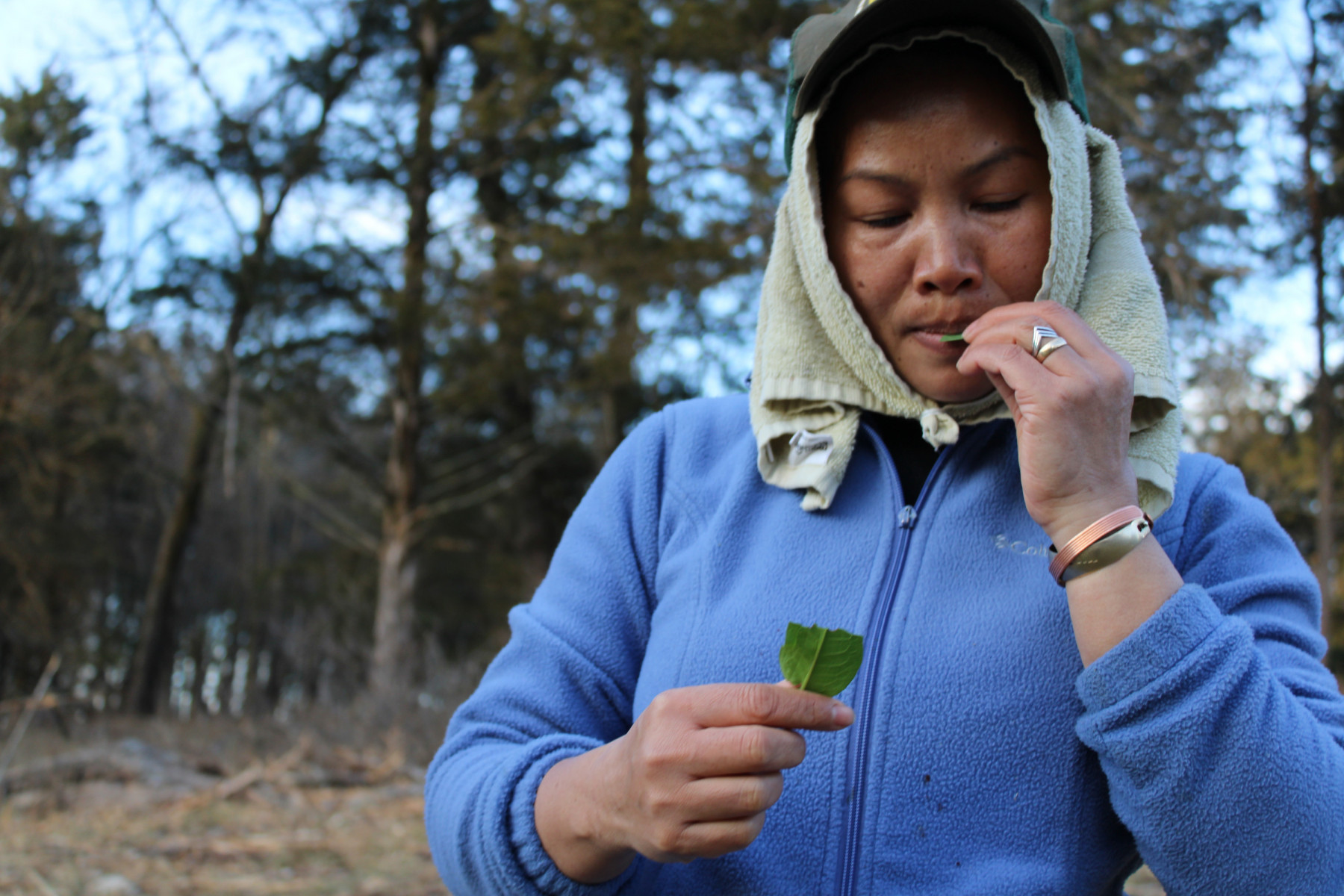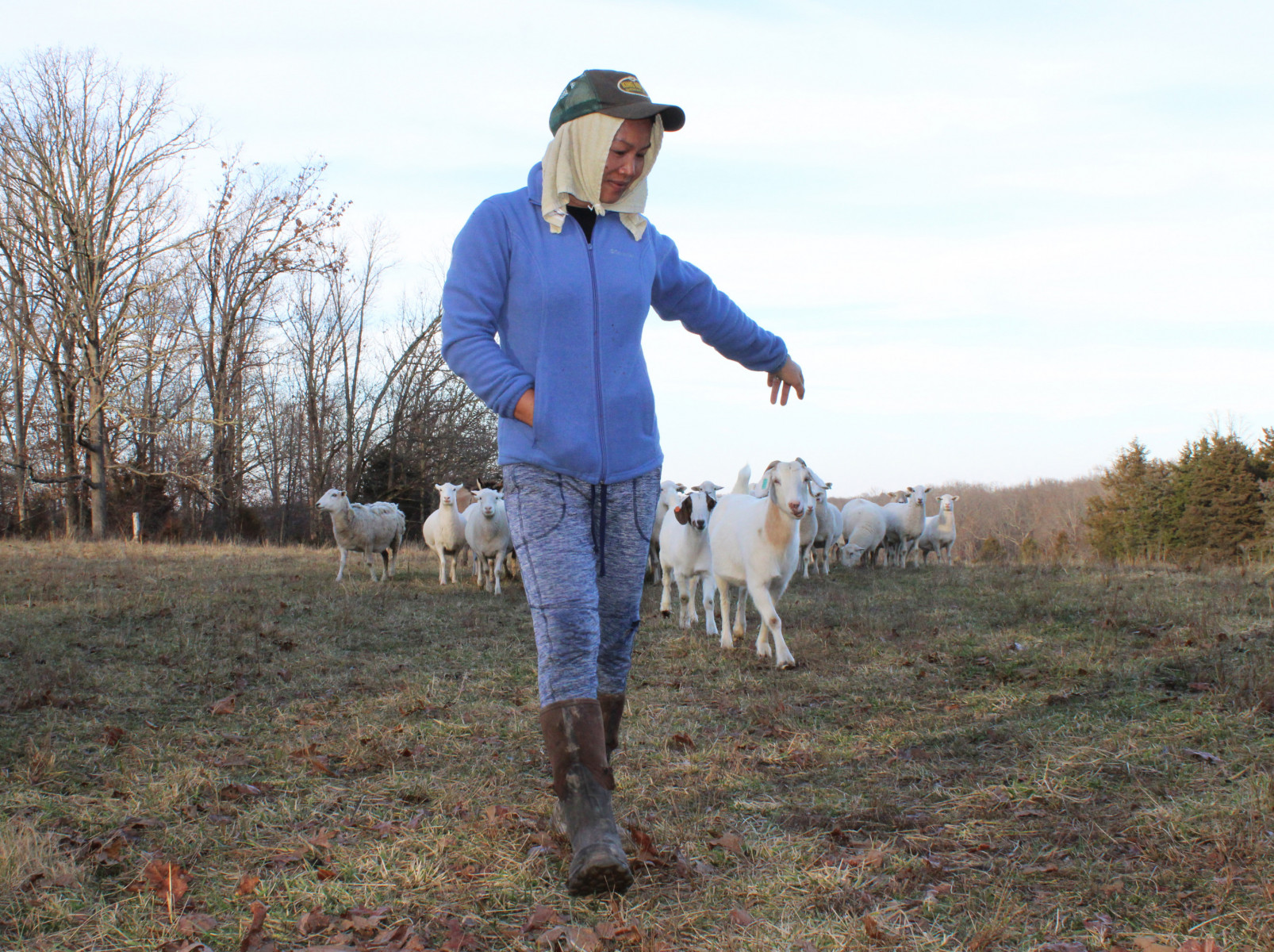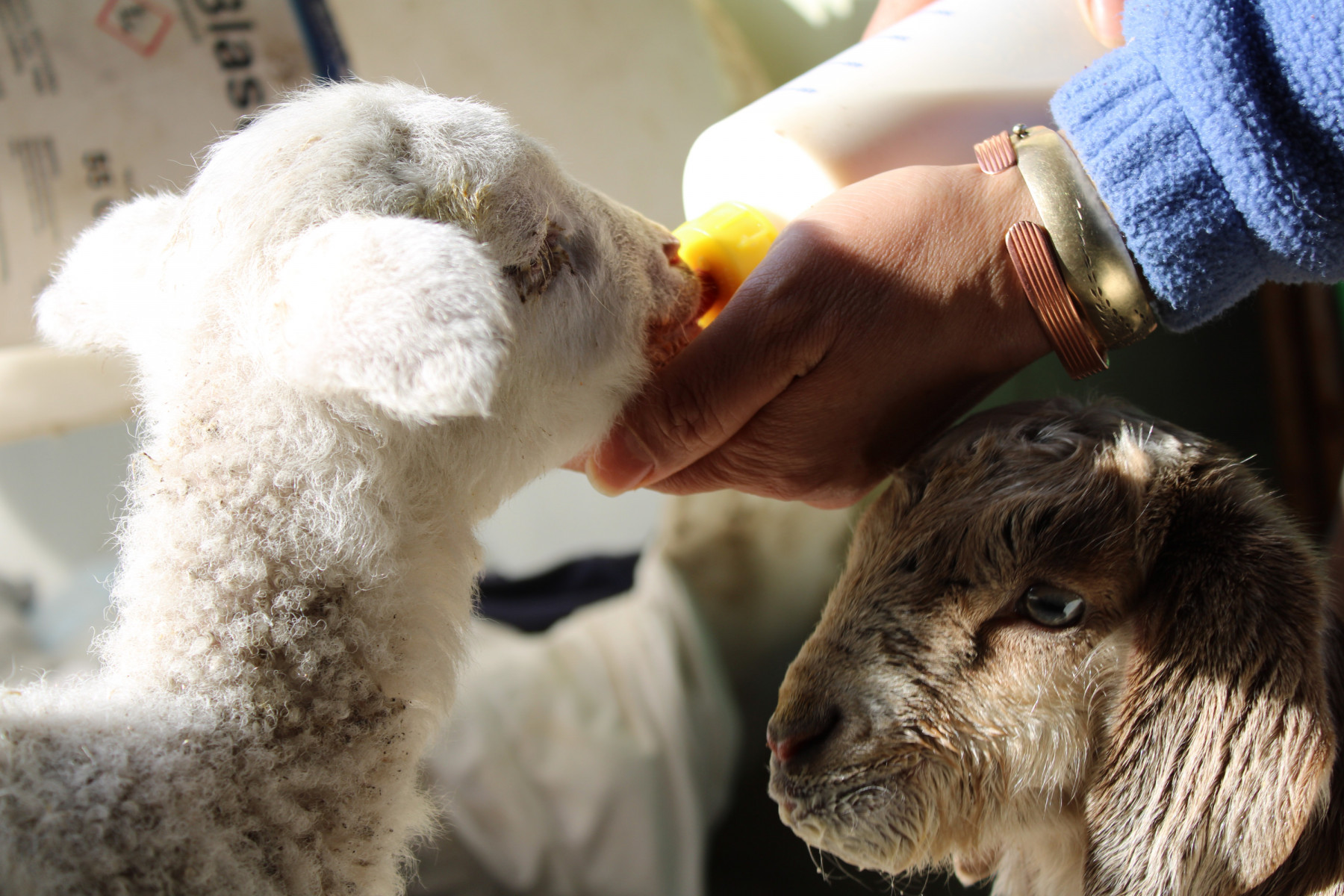
Pathoumma Meusch stands before a small herd of cattle after checking on her goats. Meusch Farms LLC produces grass-fed cattle with little environmental impact, she said. (Photo by: Lauren Ulrich, Indiana University Bloomington)

Pathoumma Meusch stands before a small herd of cattle after checking on her goats. Meusch Farms LLC produces grass-fed cattle with little environmental impact, she said. (Photo by: Lauren Ulrich, Indiana University Bloomington)
Pathoumma Meusch’s eyes squinted in concentration as she placed the sage green leaf on her tongue.
“Mmm… so good,” she said, rolling the leaf around her mouth. “Try it,” she insists.
Soft, peach-like fuzz gives way to a tart taste. Meusch doesn’t remember what the plant’s called, but it’s high in Vitamin C, she said.

Clad in rubber boots and hay-covered yoga pants, Meusch was walking across her property to check on goats over the next hill. A kitchen towel framed her face to block the midday sun, while a bright blue sweater and warm smile stood out against a dull brown winter scenery.
Meusch doesn’t consider herself revolutionary. “I’m just a farmer,” as she says. But in her days wandering the land, she’s cultivated more than squash and potatoes. The unassuming woman has inadvertently championed locally-grown food in a region dominated by industrial agriculture and redefined what it means to be a Midwestern farmer — all while leading with lessons from her grandparents.
Her trek was more of a meander. Every turn or two she’d halt to point out a new mushroom, or this time, pluck a leaf from a nearby plant.
“My grandma would always say which plant is good for this or that,” she said, reminiscing on her childhood roaming the mountains of Laos with her grandparents.
The petite woman dropped the leaf and continued walking, “bahing” hello as goats popped up over the horizon.

Meusch’s life story is as winding as her walk, taking her from Laos rainforests to the Missouri Ozarks. After falling in love with Eric Meusch, a Peace Corps volunteer serving in Laos, the pair returned to his hometown in rural Missouri to pursue a simple farming life with their two sons.
“I can’t find more happiness than when I was little and would wake up at sunrise to walk to the mountains with my grandparents,” Pathoumma Meusch said. “I want my kids to have that too.”
Meusch Farms LLC’s humble smattering of grass-fed beef and free-range chickens, chemical-free tomatoes and kale, is an increasingly rare example of small-scale, sustainable agriculture in a state ranked 3rd in the nation for beef cattle production with an agricultural sector worth $88 billion dollars.
Even as her produce grew into a successful family farm, Pathoumma Meusch said it took longer to establish roots of her own in the U.S.
“When I moved here and everything was new, I felt really small and like what I know is not valuable,” she said. “We are like tree. When you move trees from one state to another, they need time to get used to the temperature.”
Down the gravel road from Muesch Farms, a billboard reads “Beef. It’s What’s For Dinner” in bold red lettering. The slogan for America’s cattle industry brings to mind images of the country’s industrial agriculture system — one marked by large-scale operations, environmental degradation and predominantly white farm owners.
Pathoumma Meusch is one of only 0.3% of Missouri producers who are Asian, according to the 2017 Census of Agriculture. When she helped start a new farmers market in small-town Rolla, Missouri, she said she initially received pushback because of her race.
“I am Asian, and my language is hard to translate to yours,” she explained. “In the beginning, people judge you because you’re new and what you do is new.”
But Pathoumma Meusch persisted, returning each Saturday with her husband and a table full of fresh greens, determined to share healthy food and empower others in her community. In a few years, the farmers market grew from just her booth into one of the most popular markets in the area with dozens of vendors.
Nowadays, when she waves to customers and greets them by name, Pathoumma Meusch seems to stand just as tall as her husband beside her.
“I think when a lot of Asian people go to the farmers market they feel small, but I show people that you don’t need to feel small,” she said. “The earth belongs to all people. We are equally valuable.”
Pathoumma Meusch said her connection to nature motivates her to share healthy food grown on her land.
“We put in our life and soul to create the food,” she said. “I tell customers, ‘It’s not a business. You just share our food.’ That’s why we’re so famous in the community because we just represent ourselves.”
Eric Meusch, whose wardrobe consists of plaid shirts and baseball caps, said he’s not trying to promote a larger environmental cause at the farmers market.
“We’re just a tiny little example of a different way to do things,” he said. “And if that has an impact, that’s great.”

The Meusches are a normal family trying to lead a healthy lifestyle, he said. If they break the routine of American consumerism to do so, it’s because they’re authentic — not activists.
Back at their home over 8,000 miles from where they met, Pathoumma Meusch gazed at the mish-mash of vegetable patches and fruit trees in sight of her porch. “It feels perfect,” she said, smiling as a peacock struts past. “I built my dream.”
Her innovative act for the planet wasn’t inventing new farming technology or enacting policy reform. She did what seems deceptively simple: learn from those before her and embody her culture’s values in her everyday life.
She did something radical: love nature, love others, and share her love through food. By staying true to her roots, she disrupted the norm of Midwest farming and showed her community the value of new perspectives.
As she climbed up a nearby pile of mulch for a better view, Pathoumma Meusch’s small frame was illuminated against the sunset. “The day my life is done, in the last minute, I want to feel like I am valuable to this earth,” she said, pink hues washing over her face.
“I am not small, and I am not hiding,” she said, her typically soft, airy voice growing in volume. “I am really big, and I am really lucky.”